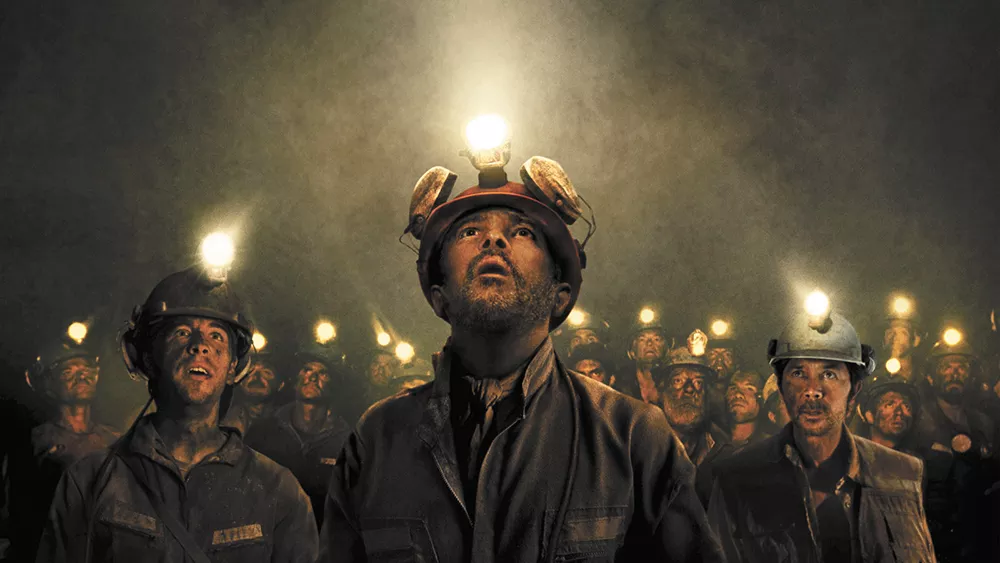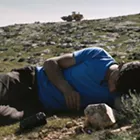Let's assume — just for the sake of argument — that you bought a ticket for The 33 without knowing anything about the story behind it. Let's say you were just introduced to several characters who worked at a mine in Chile in the summer of 2010: Mario (Antonio Banderas), who wasn't scheduled to work on this particular day, but asked to take an extra shift to earn some extra money; Alex (Mario Casas), who is blissfully happy, as his wife is pregnant with their first baby; Darío (Juan Pablo Raba), an alcoholic who is estranged from his sister, María (Juliette Binoche); and even a grey-bearded veteran who is just about to retire. And then let's say the plot showed them all heading off to work.
Now tell me that there's any other possible development, except that something terrible is going to happen to those people.
The 33 is, of course, based on the real-life incident in which 33 workers at a gold and copper mine in Chile's Atacama Desert were trapped after a massive rock fell and blocked the only exit, inspiring rescue efforts that drew international attention. The improbable circumstances behind their (historical spoiler alert) survival is a natural for cinematic treatment, one that could be inspirational both as an example of resilient faith and as a case study in institutional determination. But a movie needs more than a concept. It needs to be executed with some degree of skill. And The 33 is a case study in poor execution.
It probably doesn't help that it appears so soon after The Martian, employing a structure that's virtually identical, except that the seemingly impossible rescue is here on Earth. Half of the narrative focuses on events underground, where Mario becomes the de facto leader of the 33 miners, figuring out how to ration their meager food supplies and dealing with interpersonal tensions. The other half follows the efforts aboveground to get to them, as the Chilean government's head of mining (Rodrigo Santoro) and a no-nonsense engineer (Gabriel Byrne) try to maneuver the massive drills around pockets of impenetrable bedrock.
The 33, unlike The Martian, doesn't commit itself to being fundamentally about problem-solving, but it also doesn't succeed at being an emotional, character-based drama. It wants to grasp the sad dilemma of men separated from their loving, concerned families, even if that means setting up those connections in the manner described above — entirely in movie shorthand, too concerned with giving a handful of characters at least one identifiable relationship and/or conflict to give any individual a character that feels real. While there's much more potential in dealing with the surface goings-on — between the technical challenges, political wrangling and the tent city/media circus that surrounds the mine site like something out of Ace in the Hole — director Patricia Riggen (Under the Same Moon) and the screenwriting team still waste time on comic-relief nonsense like the wife and mistress of one miner (The Office's Oscar Nuñez) fighting over which one he loves best.
Then again, that example represents the broad strokes with which Riggen paints virtually everything in The 33 — including the performances. There's little sense of the danger or claustrophobia facing these men, because nearly every moment spent with them involves shouting matches or inspirational speeches; the actors — including Banderas and Lou Diamond Phillips — play those moments for all the bombast that isn't already underscored by the music (a sadly underwhelming final credit for the late James Horner). And it's not much better on the surface, where Binoche offers up line readings that would be embarrassing even if she weren't a French woman playing a Latina.
There's one wonderfully atypical scene in which the miners — facing what they believe might be their last supper — imagine a lavish feast of all their favorite foods. It's a terrific example of what The 33 could have accomplished if it were interested in anything resembling psychological realism, rather than ticking off a checklist of events on the way to generic uplift. There's nothing wrong with a survival-against-all-odds story that aims for the heart instead of the head, but this one keeps blasting indiscriminately away at the heart, destroying all the other vital organs along the way.♦















